Managers … they arrive, they talk the talk, they kiss the badge, and then they leave. Most, but not all, win a trophy or two along the way. Brendan Rodgers returned to Celtic last month, having already done all of the above. But where will he rank on the Etims Completely Unscientific Celtic Managers Ranked! list?
With the club having had just four incumbents across its first 90 years – Maley, McStay, McGrory, and Stein, all legendary figures – the past 45 years have seen a further 15 men occupy the hot seat. They all arrived, they all proclaimed undying love for the football club, with varying degrees of authenticity, and then they left. Rodgers is one of just three men to perform the role more than once, alongside Billy McNeill and Neil Lennon.
It’s these 15 men that this list will concern itself with; I think it’s non-negotiable that Jock Stein is Celtic’s greatest ever manager. During his 13-year tenure, Stein’s Celtic won 10 league titles, including the original nine-in-a-row, the European Cup in 1967, and made the semis (at least) of the big cup on three further occasions. It’s a no brainer, it’s beyond dispute, and big Jock remains “immortal”. We can’t offer any real context on Maley, McStay, and McGrory because they were all before our time, so what of the remaining 15 post-Stein men?
We’ll do this in three parts. Part One of the countdown offers you numbers 15 to 11. There may be trauma ahead …
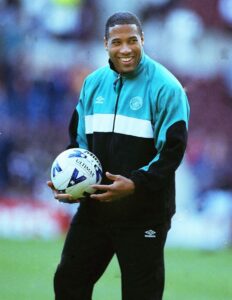
- John Barnes (1999-2000)
John Barnes was a totally mystifying appointment and he arrived with absolutely no managerial experience to recommend him in the first place. The fact that a mostly disengaged Kenny Dalglish was simultaneously unveiled in a newly created Director of Football role did little to reassure more skeptical elements within the Celtic support. It all started so well too, with a 5-0 thumping of Aberdeen at Pittodrie on opening day. Suffice to say it was all downhill from there: home and away losses to Motherwell, defeat at Ibrox, and Henrik Larsson’s horror leg break in Lyon. By early February, consecutive home defeats – against Hearts in the league, and rather more infamously, against Inverness Caley Thistle in the Scottish Cup – meant Barnes’ position quickly became untenable. After eight months in the role, Barnes was mercifully sacked from a job he was clearly ill-equipped to perform in the first place. Hopelessly out of his depth, his stubbornness and insistence on a largely unworkable 4-2-2-2 formation didn’t help his cause. Director of Golf Dalglish fared little better across the remainder of the season, an unlikely League Cup triumph excepted.
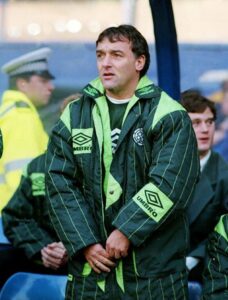
- Lou Macari (1993-1994)
Lou Macari’s seven months or so in the hot seat coincided with so much turmoil at the club it is difficult to view it through anything other than a cloudy lens. Promises, lies, false dawns, red herrings, fan boycotts, and New Years’ game shame. Ultimately it all led to the long overdue ousting of the nepotistic family “dynasty” tasked with “running” the club and the arrival of Fergus McCann as our unlikely hero. But Macari ranks ahead of Barnes only because he had far less to work with in the desperate dying days of the old Board. There’s no way Carl Muggleton, Willie Falconer, Bertie Biggins and the whiff of an oily rag can compare with Lambert, Moravcik, Viduka, Larsson et al. And there’s no way Macari’s Celtic could complete with a stacked Rangers, despite an against-all-odds win at Ibrox in his first match. There was a sense that Macari was an attempted act of appeasement by the Stiffs, appointed only because he was an ex-player during Stein’s glory years, and that board would do absolutely anything to try to blind us with wanton nostalgia. They failed, Macari failed, and when the McCann takeover happened in March 1994, wee Lou skipped off into the distance, probably just as relieved as we were that the nightmare was finally over.
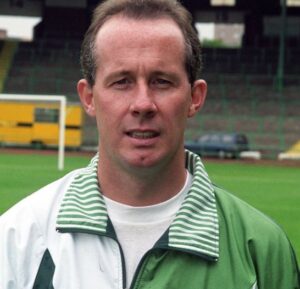
- Liam Brady (1991-1993)
If there was a mitigating circumstance behind Macari’s failure, it was that Liam Brady had left him nothing to work with. Brady had spent all the money, shaking every last crumb from the Biscuit Tin before Macari arrived. Unlike Macari, you could at least see what Brady was trying to achieve. He spent (relatively) big on Cascarino, Mowbray, Gillespie, and Slater, and there’s an argument to be made that each of those signings had some degree of prior pedigree. Alas, injuries, and in the case of Cascarino and Slater, a complete loss of form, made that outlay seem farcical. It’s probably fair to say that three players largely carried the burden for much of Brady’s tenure; Paul McStay, John Collins, and Tom Boyd. And as much as Peter Grant gutsed it out for coppers and kudos, he and the rest were mostly bit-part players in a side that couldn’t even make a cup final. Let alone win anything. Brady ranks ahead of Macari simply because at times (at times!) his team played some decent football, and there was just something much more likeable about Brady. Ultimately he was done in by a midweek defeat at Perth in October 1993, with his team having won just two of its ten league games to that point of the season.
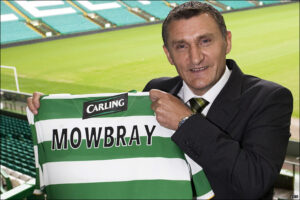
- Tony Mowbray (2009-2010)
Speaking of likeable, it’s fair to say that as an ex-player with a heartstring-tugging backstory, Tony Mowbray was given some additional breathing room by the Celtic support. Probably too much. Even though we knew, deep down, he wasn’t really up to it. Gordon Strachan had won three of the previous four league titles when Mowbray was appointed in the summer of 2009. Mowbray had what initially seemed to be a fairly solid squad to work with, and after a decent start Celtic led the early doors title race before losing at Ibrox in October. Knocked out of the Champions League by Arsenal, his team would then win just one of six Europa League group matches. If that was perhaps forgivable, what couldn’t be tolerated were the struggles his team endured on the road, away from Celtic Park, specifically in the league, culminating with an eye-watering (actual tears) 4-0 defeat at St Mirren in March. By then the league was all over bar the jeering. Even relatively regular goals from high-profile January loan signing Robbie Keane couldn’t save the day. Naturally the St Mirren defeat ended Mowbray’s tenure there and then, with his assistant Neil Lennon stepping up for the duration of the term (and a wee bit beyond, as it turned out).
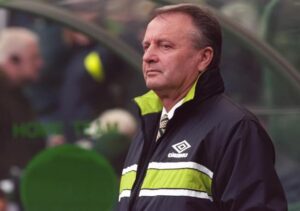
- Jozef Venglos (1998-1999)
Dr Jo. Or according to at least one ill-informed predatory tabloid: Doctor Who? The irony being that Dr Jozef Venglos arrived with a strong pedigree in the international game, having previously led the old Czechoslovakia to some success, and his standing within FIFA coaching circles was the envy of many. Sadly, none of that pedigree involved Scottish football. To be fair, Venglos was playing catch-up from day one, given that he arrived unfathomably late in the summer of 1998, at a time when expectations were through the roof after the title-winning exploits of Wim Jansen’s Celtic the season prior. His team got off to a slow start – outclassed by Croatia Zagreb in a Champions League qualifier, and unable to gain much traction or consistency in the league. But after signing Lubo Moravcik and Johan Mjallby within a few weeks of each other for a combined outlay of around £1.5m things started to improve. A highly memorable 5-1 humping of Rangers followed in November, but by that time Celtic were already something like ten points behind in the league and it was a forlorn task trying make up that ground over the second half of the season – Rangers winning by a six-point margin in the end. A 1-0 defeat against the same foe in the Scottish Cup final brought the Venglos tenure to its inevitable painful conclusion a few weeks later. There was definitely something about him, just not enough to sate the cravings of a support desperate to maintain the forward momentum gained under Jansen. A genuinely nice man and something of a technical guru, he was notionally “employed” as a “scout” for a period during Martin O’Neill’s tenure. R.I.P. Dr. Jo (died 2021).
To be continued …
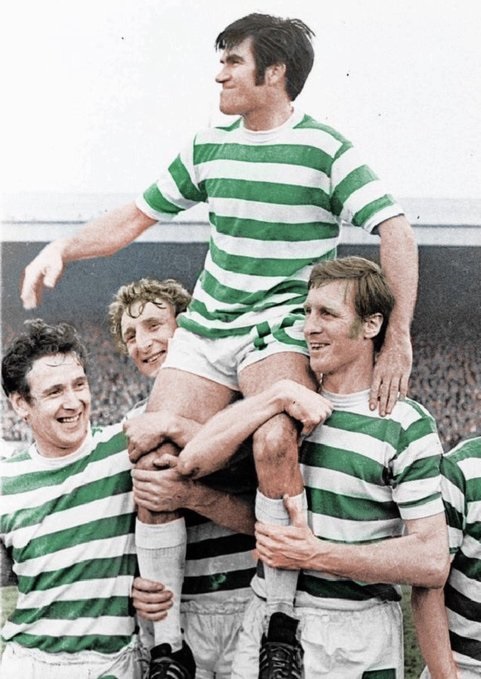
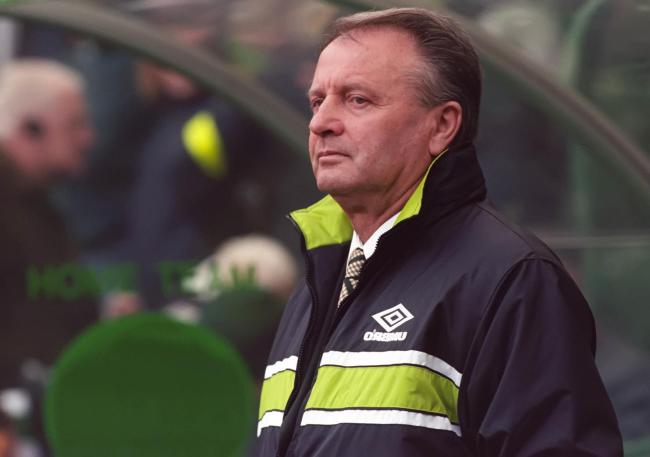
Nearly a month without etims, almost as bad as no footie at Parkhead, so eagerly hit the page for an early morning quicky, with a couple of guys in shell suits and a remembrance of not so greater days preferably learnt from and forgotten! So at the start of the day and a whole new season to start, I am now slowly losing the will, many thanks! 🙂 Oh well, welcome back and hopefully tomorrows will have some fond memories to whet the whistle! HH!
Agreed, missed the etims content. Hope you have all been well
Ffs ya alchy bastards up yer game and get the regular updates back. Cheers for sending a shiver down our spine with this lot. Have you been hacked by the Davie Dodds Elephant Man Loyal???
I thought Peter the pointer was the assistant to Tony Mowbray.
You are correct.
Lennon was retained by Lawwell against Mowbray’s wishes; another wretched interference.
I feel like over the last month I have been having multiple affairs behind etims back, I have sniffed at various “all things” Celtic but most of them do not make me laugh at their lack of humour content, the closest is 20 minute tims…come back and start fulfilling my days..
I liked the order and the comments. I recall a couple of good moments from Barnes team, Aberdeen at Pittrodie, I think . Mowbray was a good choice on paper, his Hibs and WBA teams played decent football, he was a courageous defender send brave in his private life. It did not work. I remember Slater from West Ham, looked as if he was going to be brilliant, whole career fizzled out.
Macari and Brady victims of the Board.
Mowbray came after getting WBA relegated and that may also have happened with Hibs.
Yes, both played good football but unsuccessfully and that’s never going to work at Celtic.
“I think it’s non-negotiable that Jock Stein is Celtic’s greatest ever manager.”
Maley and Stein are joint first, as both built multiple teams, beat the best both domestically and outside, won dozens of cups/titles, including everything there was to play for in a single season.